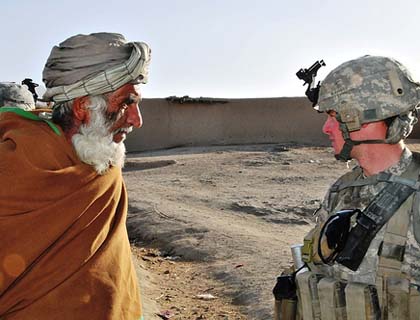Early this month President Karzai paid a visit to Washington where he held talks with President Obama and other top US political officials. Apparently, he could get the agreement of his counterpart over issues he was fervently looking for. He got the agreement of President Obama to equip Afghan Nation Security Forces (ANSF) with advanced weaponry; focus on their training; change the combating role of US force to supporting months before the previous set schedule; hand over the responsibilities of prisons to Afghans and finally support the Afghan-led peace negotiation, particularly, an all-out but reluctant support for establishment of a political office for Taliban in Qatar.
While in return he did not make any visible change in his position regarding US demands. He evaded from the issue of legal immunity for the presence of US soldiers beyond 2014 whose mission would be hunting key figures of Al-Qaeda and training of Afghan security forces. However, in his speech in the US, he said that his government had no problem with the numbers of US soldiers beyond 2014, but the framework of their activities should be determined. But the statement does not mean that he accepted the legal immunity for US soldiers. Till now he has stood against the demand, linking the issue to national sovereignty.
Indeed the national sovereignty frequently pulled US at the backstage in the diplomatic bargaining. Previously, the issue of running foreign prisons inside the country became controversial. The US resisted handing over the responsibility of Bagram prison to Afghan government because of overwhelming fear about release of prisoners who are deemed highly dangerous. Certainly the fear of US was realizable as already one-third of three thousand inmates in Bagram have been released or about to be released in the future. When President Karzai formally announced that running prison by foreign allies was contradictory to national sovereignty, the US stepped back and handed over the Bagram prison.
Because when it comes to national sovereignty, the relation becomes white and black that only one option remains to choose. Whether the US decides to violate the national sovereignty or step back. The first option is consequential as it may not only lose its relation with Kabul allies but also fuel anger and indirectly support the anti-Western front of Taliban militants. Therefore, in the case of Bagram it decided to yield. But, what about legal immunity for its soldiers? Will president Obama decide to keep force even without legal immunity? The answer is a big “nix”.
Just look at the similar condition in Iraq. No doubt, the US had far larger interest in Iraq. Supporting a functional democracy in Iraq, could open the conservative society of not only Iraq but the entire Arab world. On the other hand, American companies could outdo its regional and global competitors of the relation between Baghdad and Washington but their relations got a degree warmer.
But Iraqi politicians needed votes from all layers and wings in the country. So, they resisted against legal immunity for US soldiers. As observed, President Obama never came short and finally pulled out all US soldiers in spite of high level of risk to US achievements.
Because there was a possibility that as result of Washington efforts, an Iran-like Shiite government pops up. With existence of such threat, President Obama pulled out all US soldiers. Definitely, without legal immunity, the Washington will do the same thing in Afghanistan no matter even if the security situation turns volatile in their absence. Now it is up to President whether he finally accepts or not but zero military option has perplexed Afghan people, including President Karzai. His tone of voice talking after raised issue of complete withdrawal shows that he has become much flexible. His statements do not bear similarity to his previous harsh criticisms of foreign allies. He indirectly has noticed the importance of presence of US soldiers. Because it is not clear if the government avoids conferring legal immunity, to what extent the US will be prepared to remain committed to its promises in terms of financial and logistic support.
Moreover, linking the issue of legal immunity to national sovereignty is dangerous. Such an issue restricts the sphere of diplomatic bargaining. Certainly, Afghanistan is not better than some regional countries where the US has military bases and their soldiers enjoy legal immunity, yet no one talks about violation of the national sovereignty. The sovereignty can be violated if a country forces another to allow establish bases, while presence of soldiers of an ally does not bear such thing, rather this issue bears much more similarity to diplomatic immunity conferred to diplomats of country.
In fact, it is a very normal thing in the present military alliance among nations. US military presence is aligned with national interests. It is vital for maintenance of peace and security. It is not certain in their absence, the country does not go on the way it went after USSR withdrawal. Definitely, even their symbolic presence sends a message to armed oppositions and regional networks that try to destabilize the country and they would realize that the US would not leave the country alone. Such message is of high importance as militants will lose hope of recapturing the country, and regional players will stop dreaming to continue their dominance through supporting militants. Thus, it is highly appreciating if the military relations become deeper between the two countries.

